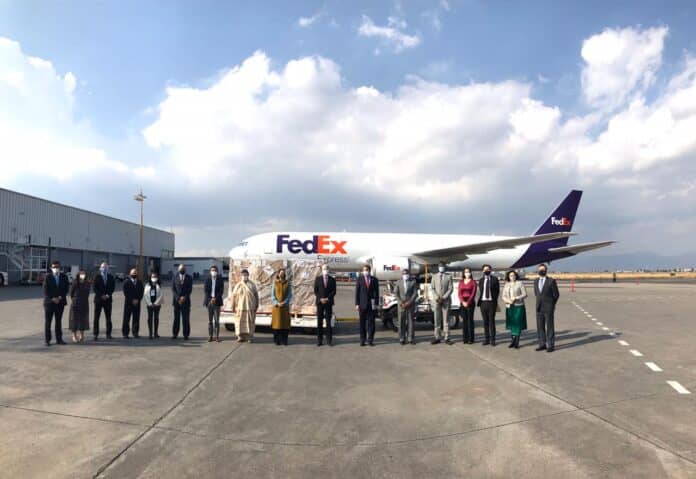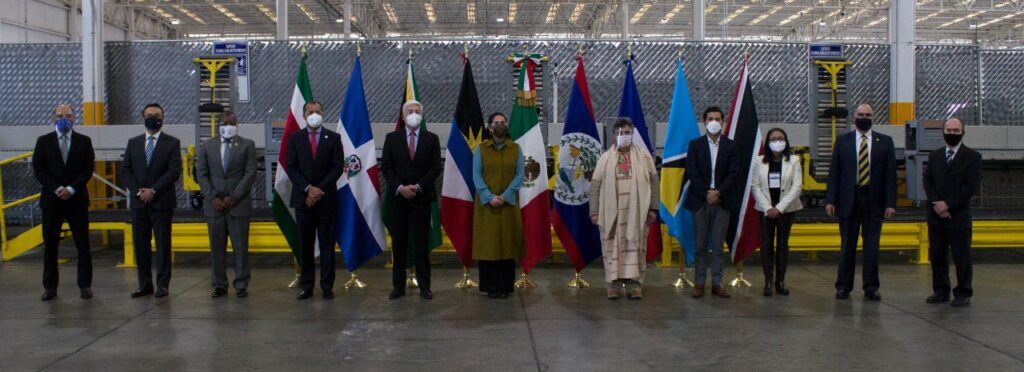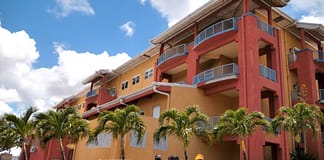
The Ministry of Foreign Affairs of Mexico, through the Mexican Agency for International Cooperation for Development (AMEXCID), sent the first medical mechanical breathing devices made in Mexico to some Caribbean countries.
This fulfills the agreed commitment to send the devices developed in Mexico to Antigua and Barbuda, Belize, Guyana, Haiti, Dominican Republic, Saint Lucia, Suriname and Trinidad and Tobago.
The Executive Director of AMEXCID, Laura Elena Carrillo Cubillas, highlighted how the coordination that the Government of Mexico carried out with the private initiative and with the scientific community, through the Salvador Zubirán National Institute of Medical Sciences and Nutrition and Dr. David Kershenobich, gave results in a very short time.
“We have understood that it is a priority for the country. We have understood that we need to be self-sufficient and we have come to build these ventilators that are not only saving the lives of Mexican men and women, but we also hope that they will save the lives of our Caribbean siblings,” she said.
At the Toluca International Airport, Carrillo Cubillas explained that, after making the voltage and technical adjustments required for the correct operation in each country, the conviction of President Andrés Manuel López Obrador and Foreign Secretary Marcelo Ebrar is demonstrated with facts: Mexico cares about what happens in the Caribbean.
“We care a lot about what happens in the Caribbean, we care a lot about what happens with our sisters and brothers in Central America, Latin America and of course in the Caribbean, as we have said. It is important to us that they know that we are not alone and if we have shown something in this pandemic, it is that together we achieve much more”, she stressed.

On behalf of the Caribbean countries, the Dominican Republic’s Ambassador to Mexico, Jonny de Jesús Martínez Mézquita, showed appreciation for Mexico’s generosity and solidarity with these nations.
“This unwavering commitment of sister nations has been endorsed by His Excellency President Andrés Manuel López Obrador whom we are thankful for, from the first moment of his administration, he placed in the center of his concern and priorities the strengthening of the unity and cooperation with the countries of Latin America and the Caribbean. The act that we celebrate today is proof of this,” he said.

He added that in the Mexican Ministry of Foreign Affairs they had always found an ally and an interlocutor who has been always attentive and interested in the dialogue and the search for solutions. “The pandemic has become a challenge and an important opportunity to rethink global priorities. Threats like this can only be confronted and overcome through unity and cooperation,” he said.
The ventilators were manufactured with one hundred percent Mexican technology and by a Mexican company. From the end of August to date, both the Ministry of Foreign Affairs and AMEXCID maintained contact with the recipient countries to learn about the technical, medical and safety requirements, as well as in matter of scientific-technical in order to make the donation of the equipment a reality. The devices comply with the international standards of operation and efficiency.
Advertise with the mоѕt vіѕіtеd nеwѕ ѕіtе іn Antigua!
We offer fully customizable and flexible digital marketing packages.
Contact us at [email protected]
















Government at work!
??? Thank you Mexico but …
The PM & Sir Molywn boasted ages ago at opening of infectious diseases unit, state of the art oxygen pressurizing system and a ventilator for each intensive care bed AT THE INFECTIOUS DISEASES UNIT.
The article gave thanks to, I think the Jumby Bay Fund, Mill Reef Club, people overseas for said oxygen system (big blue tanks in a control room shown in picture) & ventilators (shown next to beds) which gave Antigua a ventilator capacity per head of population that far outstripped most other countries.
The article also thanked nationals who donated time & resources to repurpose the old ward quickly and in a world-class manner.
SO
Why the need for additional ventilators from Mexico when, based on above, we have plenty and have only needed to use then for less than 10-15 patients (not all at the same time)
Why was the lady who died recently moved to MSJMC ICU, when PM & Sir Molwyn told us the whole point of such an advanced world beating INFECTIOUS diseases unit was to ISOLATE infectious patients throughout every stage of their treatment.
Does MSJMC have a hermetically sealed sterile infectious disease icu bed, with seperate HVAC to main hospital aircon system?
Does MSJMC have a sealed decontamination room for team members immediately outside the sealed infectious ICU bed?
Did staff only treat this patient, or others on ICU?
Something is OFF about all of this.
Would appreciate ANR re-running all their Infectious Disease Unit articles as cannot find them. My comments written based on my memory, apologies for any errors in advance.
Always a beg.
Wow. You covidiots never ceases to amaze.
China also seems to have a military agenda in the Caribbean region… Chinese Defense Minister Wei Fenghe already is on record expressing China’s willingness to deepen military cooperation with Caribbean countries.
Of more concern to US security interests is the ongoing seaport expansion project in the already commercially important port at Kingston, Jamaica, as well as the port at Freeport, Bahamas, China’s possible new base of operations 90 miles off the US coast.
China is clearly not a government that honors its agreements…. The US can ill afford any Chinese drive to place under threat any Western Hemisphere country, much less the United States.
China’s Communist Party (CCP) seems to be implementing a multidimensional strategy in the Caribbean, reaping economic, political and potentially military gains a few miles offshore the United States. China’s ultimate objective of its Caribbean strategy may well be to confront the US, not only with its presence near the mainland US, but also with a situation analogous to America’s military presence in the region of the South China Sea. There, China created new islands in the sea, pledged not to militarize them, then went and militarized them.
It is important to remember that China also promised Hong Kong autonomy until 2047, then, in 2020, jumped the gun by 27 years. “Hong Kong will be another communist-run city under China’s strict control,” US Secretary of State Mike Pompeo declared in July. China is clearly not a government that honors its agreements.
The CCP leadership has also been launching a diplomatic effort in the Caribbean with the goal of delegitimizing the state of Taiwan, while encouraging regional countries to open relations with the People’s Republic of China (PRC).
Chinese shipments of military and police equipment to several Caribbean states could be developing into beachheads for future People’s Liberation Army (PLA) “advisory groups” in the Western Hemisphere. China’s construction projects already include the modernization of airports and seaports, which could increase Chinese geopolitical and military influence in the region. Chinese Defense Minister Wei Fenghe already is on record expressing China’s willingness to deepen military cooperation with Caribbean countries.
Additionally, China has been investing considerable revenue in the economies of the hemisphere’s anti-American Caribbean socialist states of Cuba and Venezuela. China’s establishment of a Caribbean Belt and Road Sector is an opportunity for CCP intelligence operatives to suborn the sovereignty of Caribbean countries by luring these societies into “debt trap” economic dependency on China. In Sri Lanka, for instance, the country’s inability to pay back its Chinese creditors for Beijing’s modernization of the port of Hambantota has resulted in the South Asian country’s effective loss of the port.
China’s Caribbean offensive so far includes a “medical diplomacy” initiative that is providing Latin America, but especially the region’s island states, with face masks, personal protective gowns and gloves, ventilators, ambulances, and pharmaceuticals. This May, China convened a video-link conference on the COVID-19 virus at the vice-ministerial level with the nine Caribbean countries that have diplomatic relations with Beijing: Antigua, Barbuda, Barbados, the Bahamas, Dominica, Granada, Guyana, Suriname, and Trinidad and Tobago.
China’s dominant role as a world leader in the production of pharmaceuticals and medical devices is, as presumably intended, enabling the Chinese to garner considerable good will in the region. China has already delivered 30,000 virus test kits to Jamaica and at least 100,000 protective masks to Cuba as well as about 100 ventilators to the Dominican Republic. China also has built hospitals in Dominica, St. Kitts, Barbados and Trinidad, as well as a children’s hospital in Jamaica. Throughout the COVID-19 virus epidemic, China has also donated medical supplies to around 15 Caribbean states.
Chinese investors are plowing millions of dollars into tourist-oriented construction projects. China’s state-supported construction enterprises are building hotel resorts in the Bahamas, Guyana and Barbados. Of more concern to US security interests is the ongoing seaport expansion project in the already commercially important port at Kingston, Jamaica, as well as the port at Freeport, Bahamas, China’s possible new base of operations 90 miles off the US coast.
Other Chinese-sponsored port projects are underway at Cuba’s ports of Santiago and Mariel, as well as Guyana’s port of Berbice. Another Chinese construction project that deserves scrutiny for its implication for US national security is China’s modernization of Guyana’s Cheddi Jagan international airport. Once the site of US Air Force military operations during World War II, with its runway of over 10,000 feet, it is capable of hosting Chinese military jet aircraft. However, disagreements over the terms of the original contract signed in 2011 are a source of tension between the Chinese contractor and the usually pro-Chinese Guyanese government. China also has an interest in regional access to raw materials such as bauxite from Jamaica, and offshore oil near Guyana.
The Chinese regime is effectively employing “soft power” by way of propagating anti-US diplomacy through China’s regional ambassadors and Confucius Institutes. Particularly active in this regard is Liu Quan, the China’s Ambassador to Suriname. China’s propaganda arm has established approximately 10 of its 45 pro-Communist Confucius Institutes in the region, in Antigua and Barbuda, Suriname, the Bahamas, Barbados, Cuba, Guyana, Jamaica, Trinidad and Tobago, and Venezuela. These institutes propagate the same ideological pro-Chinese Communist Party, anti-Taiwan line. Additionally, the Confucius Institute in Suriname, home to one of the largest number of overseas Chinese of any country in the region, may also be attempting to recruit agents
In 2018, the Dominican Republic revoked its diplomatic ties to Taiwan, presumably to take advantage of the economic opportunities that relations with China might bring.
China’s military agenda in the Caribbean region includes the Peoples Liberation Army (PLA) Air Force, which has donated Chinese Y-12 transport aircraft to Guyana. PLA military aid continues to arrive in Jamaica. Chinese-produced motorcycles have been exported to West Indian police forces in Trinidad and Tobago, and police cars to Guyana. Moreover, selected military officers from virtually every Caribbean country continue to receive training at Chinese military academies.
Were China to establish a beachhead in the Caribbean, the US could be faced with a dark replay of the 1962 Cuban missile crisis. China could insist that the US reduce, or entirely withdraw, its considerable military force structure in the Western Pacific Ocean, in exchange for a draw-down of PLA assets in the Caribbean — or any other bargain it dreamed up.
US policymakers need seriously to address Communist China’s aggressive expansionist policies in the Caribbean. The US should not permit the PLA Air Force or the PLA Navy to establish bases that could interfere with American freedom of navigation, both for commerce and for military convoys re-supplying NATO allies in the event of a military crisis. The US can ill afford any Chinese drive to place under threat any Western Hemisphere country, much less the United States.
Dr. Lawrence A. Franklin was the Iran Desk Officer for Secretary of Defense Rumsfeld. He also served on active duty with the U.S. Army and as a Colonel in the Air Force Reserve.
Comments are closed.